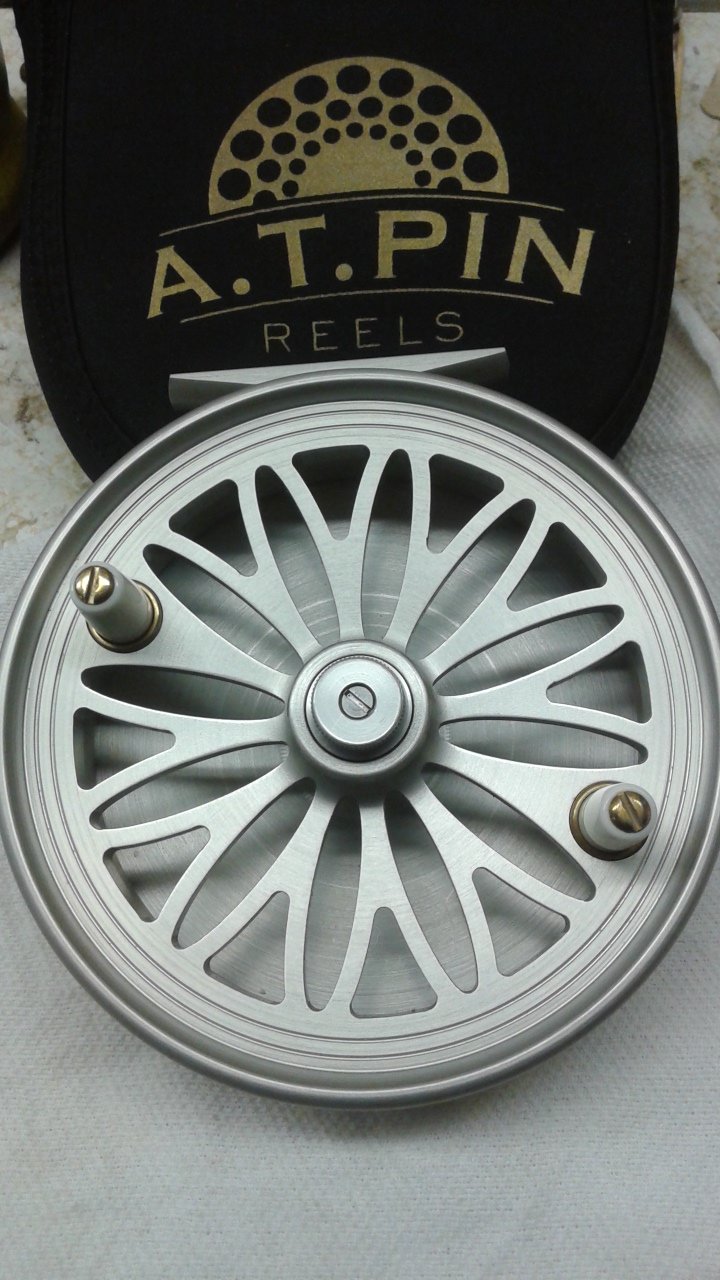-
Posts
9,564 -
Joined
-
Last visited
-
Days Won
209
Content Type
Events
Profiles
Forums
Store
Everything posted by Spiel
-
Thanks Jacques, it was nice to get out for a bit. Problem is old faithful has been out of production for many years to the best of my knowledge.
-

Simple start for getting back into wood working
Spiel replied to Mattones's topic in General Discussion
Simple, perhaps for you but the end result looks great to me. -
I sometimes think I'm gonna burst after consuming one too many beers.
-
Impressive job guys! I gave it a shot last night for my first time this year, nothing big but it was good to be out there.
-
Well we didn't get skunked. Nothing big landed, though I had my chance with a big ass rainbow that made a fool of me. I believe it was 5 boated for 7 on. Fish Farmer may have a few pics of the little ones we kept for the BBQ.
-
Thanks Tony. I expected with the big westerlies the surface temps would be cool, I'll run a few high lines for bows. Leaving shortly.
-

Smelly Hands After Cleaning Fish - What To Do???
Spiel replied to Leecher's topic in General Discussion
I wish I had to worry about such things. -
I'm heading out of the canal launch (Hamilton) later this afternoon with Fish Farmer. Anyone got any tips or starting points after the big blow?
-
Hahahahaha, LMAO, I'd pay well to see pictures of that! Glad to see you got a few fish, I may try my luck out there this evening.
-
Spending your B'day trout fishing with your daughter and getting a few as well, sounds like a perfect B'day Jacques.
-
Yep, fishing with Mr. Dunn is on my bucket list.
-

Dogfish wriggle after being skinned and gutted
Spiel replied to Gerritt's topic in General Discussion
LMAO off at, and I quote, "the fish is moving but it's dead." Okay...... -
I'd be all over this one if the choice was mine. Regardless of what you choose Cliff I hope it becomes the fishing trip of your dreams.
-
Sounds like you're good to go Sam. To clarify I didn't build the rod but I did win it and it had never been used before I gave it to Sam.
-
Yep, #89 runs East West. Perhaps you were on #24?
-
Mayfly mayhem on shores of Lake Erie is a sign of good water quality Thursday, June 24, 2010 Micheal Scott / cleveland.com If you think this summer's mayfly madness is madder than most, you may be right -- depending on where you live along the Lake Erie shoreline. And if it turns out that these funky-looking, nonbiting bugs are a big batch which have molted from the underwater sediment offshore from Cleveland, we might be witnessing the next stage in an ongoing ecological recovery of Lake Erie. So holster your fly swatters, everyone: This is the kind of bad bug problem that's really a good thing for Northeast Ohio. First of all, more mayflies means bigger fish, including prized Lake Erie yellow perch, which feast on the insects just as they are emerging from the water. And an exploding insect population coming out of the lake each summer is also considered a sign of a healthier, oxygen-rich waters, lake scientists say. "That's true: A thick emergence of mayflies might be a symbol that we've cleaned up our act on Lake Erie," said Don Schloesser, a veteran mayfly researcher who at the U.S. Geological Survey's Great Lakes Science Center in Ann Arbor, Mich. who said the insects returned in earnest to Lake Erie only in the last 20 years. "But it will take a little longer to see whether this is a permanent comeback -- for the bugs and for the lake." Bug bodies piling up on lakeshore Temporary or not, the annual invasion of the bothersome insects often overwhelm some lakeside neighborhoods: • Suburban observers from Rocky River to Bay Village to Euclid began noticing the long-legged pests gathering around street lights and screen doors over the last week or so. • In Vermilion Lagoons, ducks and other shorebirds have been seen gobbling up piles of mayfly carcasses. "That's fine for the birds, but the mayflies smell fishy when they die and I had a pile about two or three feet in diameter by my garage door," said longtime lagoons resident Tody Root, 82. •Workers at Lakeside, a small resort community near Kelley's Island, pushed the bugs off streets with a front-end loader and then off sidewalks with leaf blowers. "The worst day was probably last Wednesday -- every light in town had a cloud of mayflies around it at night," said Alex Kontos, marketing director for the Lakeside Association. "But we get it like this almost every year, so we're used to getting bugged." Most everyone on the west end of Lake Erie would agree -- and has a big bug story to tell. • The most notable was the brownout of June 1996, when mayflies actually briefly conducted electricity across insulators after they were drawn to the lights of Toledo area lakeshore electrical substation. * In Port Clinton, one former mayor actually secured grant money in the 1990s to compost the rotting mayfly bodies. • In 1999, a Pennsylvania researcher teamed up with meteorologists at a local TV station to capture Doppler radar images of the clouds of bugs coming ashore near Erie, Pa. Bug biology tells a story But the story of those big bugs also mirrors the history of changing water quality conditions of the lake, Schloesser said. "The mayflies were abounding in the 1920s and '30s in the Western Basin, but then almost completely disappeared in the late 1950s" because of worsening pollution, he said. They returned in the 1990s, researchers said, because the lake was generally cleaner following the pollution control measures of the 1970s. Scientists were also pleased to find mayfly nymphs in the sediment of the entire lake -- beyond just the biologically rich western side of the lake. But something happened again in about 2001 to practically eliminate the nymphs everywhere but in that far west end. "We suspected environmental factors, focusing in on the lack of oxygen," said Ken Krieger, acting director of the National Center for Water Quality Research at Heidelberg College. Krieger and others suspect the role of algae die offs, which create an oxygen-depleted "dead zone" in the lake. Krieger had also written an Ohio Sea Grant publication (pdf) in the 1990s heralding the return of the mayfly. But suspicion isn't proof. Since Krieger's lab and others haven't sampled the central basin of the lake for mayfly nymphs much since then, no one knows for certain if mayflies found near Cleveland are just the ultralight, wind-blown refugees from the west or a new emergence of a central basin population. New theories on mayfly life Schloesser has suggested another explanation for the up-and-down appearance of mayflies in recent years: A four-year cycle -- one year of abundance followed by three years of lesser populations, sometimes dramatically so. He says that might be evidence of a cycling of oxygen availability -- either because of the rising tide of quagga mussels in the lake or because of the mayfly nymphs themselves who use vast amounts of oxygen in their peak year. Or maybe the the mayflies are telling us something important about Lake Erie. "It's good news that there are so many mayflies, but we know the cycling is not part of the their natural system," he said. "So maybe something else we're unaware of is teetering in the balance. "That teetering could go backwards and they'll disappear again or it could be what we're all hoping for -- that Lake Erie is really recovering and on its way to being fully restored."
-
FAA clips pilot's wings June 24, 2010 Chris Paschenko / galvestondailynews.com CRYSTAL BEACH (TEXAS) — The Federal Aviation Administration revoked for a year the license a pilot accused of buzzing beachgoers in March, a spokesman said Wednesday. The FAA claims Joseph B. Kirbow flew a Diamond Aircraft DA40 so low it broke a fisherman's pole by snagging the line and wind from the plane twice knocked the hat from a man's head, according to a June 16 letter to Kirbow. Kirbow had two passengers aboard the plane when it left Beaumont and buzzed Crystal Beach on March 13, the FAA said. The plane was registered to Kirbow Transportation Enterprises, according to FAA records. "When you were asked by one of the passengers where you were going, you replied that you were going to buzz the beach," the revocation letter states. Kirbow flew at altitudes as low as 15 feet above anglers wading in the surf and made multiple passes over a group of occupied vehicles and others on the beach, the letter states. One witness, Terry Rodery, told The Daily News that the plane buzzed a group of Jeep enthusiasts. "I think it's encouraging the FAA did the investigation and sided with general public and acknowledged the pilot endangered himself and innocent bystanders," Rodery said. "I thought a harsher punishment would have been better, but the FAA knows best." During one pass, Kirbow banked and made a steep decent directly toward a man on the beach, the letter states. "You flew so low over him that the wind from your aircraft blew his hat off on two different passes," the letter states, noting the man saw the pilot smiling and a passenger waiving. "You flew so close to another individual on the beach that you broke his fishing pole when your aircraft snagged his fishing line," the letter states. Kirbow is accused of telling a passenger he wouldn't be disciplined and had buzzed the beach many times. After learning of complaints to the sheriff's office, Kirbow also is accused of phoning a passenger and telling her, "she was never on that plane," the letter states. "When you next spoke with the passenger, you told her that she should go along with the story that the aircraft was experiencing engine trouble," the letter states. "You laughed each time you made a low pass that caused people on the beach to duck in fear of being hit," the letter states. The FAA accused Kirbow of actions that were reckless so as to endanger life and property, yet the agency considers the incident a federal civil matter, which it doesn't refer to law enforcement. Kirbow has 10 days to appeal the revocation to the National Transportation Safety Board, Lynn Lunsford, a spokesman for the FAA, said. Although there is no fine associated with the revocation, Kirbow could face civil penalties up to $1,100 a day for each day he fails to surrender the license, the letter state. The Daily News was unable to reach Kirbow for comment, being unable to find a listed telephone number for him. No public listing for Kirbow Transportation Enterprises could be found. "Losing your certificate for a year is a pretty serious consequence for any pilot that values the privilege," Lunsford said.
-
Same sentiments for you Ron.
-
I agree, nicely done Dave, nicely done!
-
You're killing me Alan but don't you dare stop.
-
Hi Sam.
-
Crikey, me thinks I need a new puter.
-
Sheeeeesh, how many pictures you got in your post Joey? Every time I try to see 'em (3 times now) my ole puter freezes right up.
-
Perhaps a quick perusal of the classified rules would explain things.....just sayin. http://www.ofncommun...ction=rules&f=5

